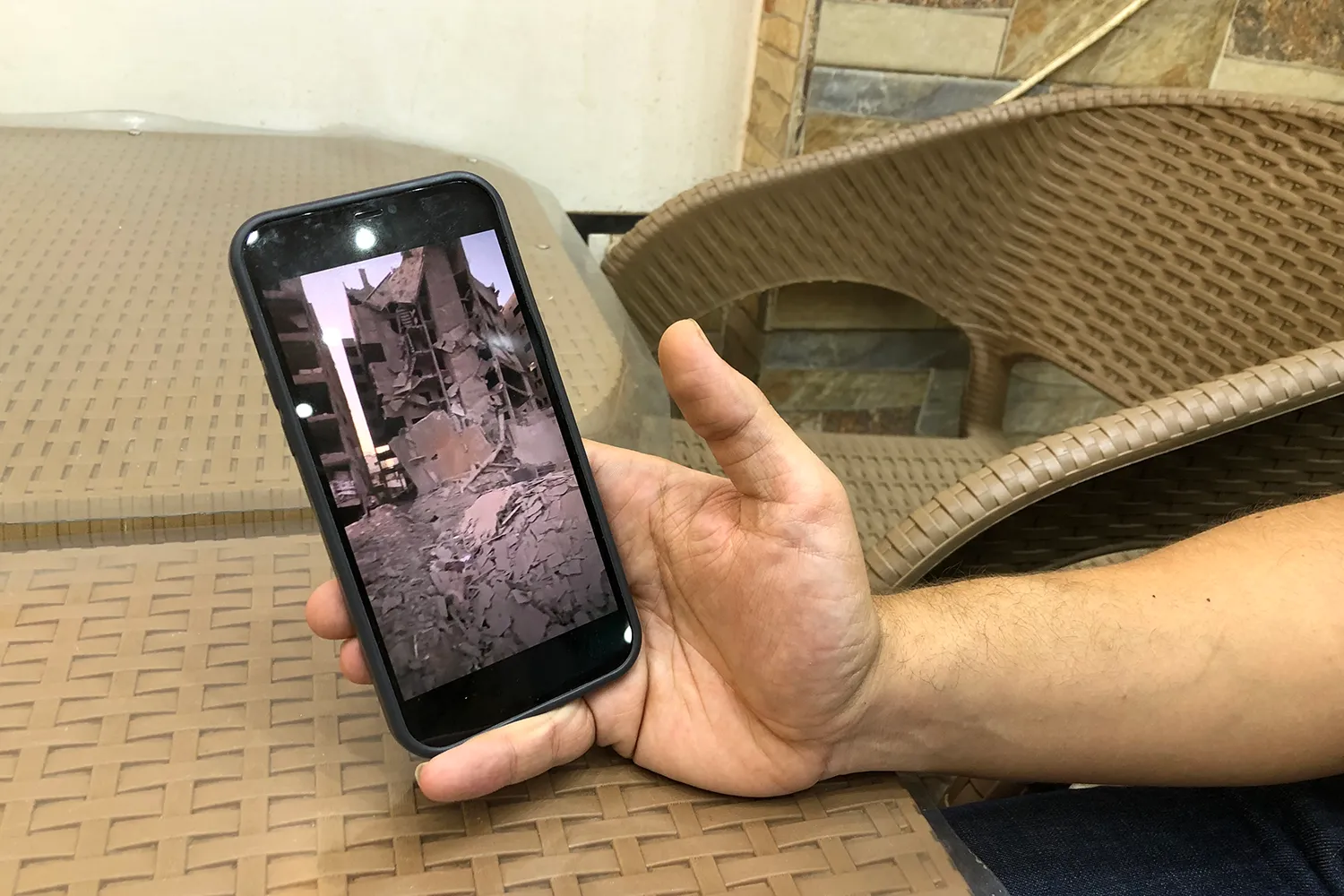Dispatch
How 100,000 Palestinians Are Surviving in Egypt Without Refugee Status
Even after buying their way out of Gaza, Palestinians remain vulnerable.
CAIRO—Although Egypt has refused to accept refugees from the Gaza Strip, more than 100,000 Palestinians have crossed the border into Egypt since the start of Israel’s offensive in Gaza following Hamas’s attack on Oct. 7, 2023.
CAIRO—Although Egypt has refused to accept refugees from the Gaza Strip, more than 100,000 Palestinians have crossed the border into Egypt since the start of Israel’s offensive in Gaza following Hamas’s attack on Oct. 7, 2023.
Khaled Shabir, a 29-year-old man, is one of the Palestinians who managed to flee. He entered Egypt in March, four months after the Israeli army bombed his house in the southern Gazan city of Khan Yunis. The attack killed his parents, but he survived with crushed bones in his foot, thigh, and hand, which landed him in a hospital and then a field medical facility.
Some Palestinians are able to get a free medical transfer to Egypt for life-threatening conditions. But Shabir had to go the route of most who have fled: paying Hala Consulting and Tourism, the only company that secures passage from Gaza into Egypt. Hala, whose owner reportedly has close ties with the Egyptian authorities, charges $2,500 to $5,000 per person crossing over—much more than most Palestinians can afford.
Shabir did not have the money. But with a crowdfunding campaign, he was able to raise $5,000 to cross into Egypt. “Doctors at the hospital were sympathetic to my condition and waived their financial fees for my surgeries,” he wrote in a text message from his hospital bed in Cairo on June 4.
Like most Palestinians who have recently arrived in Egypt, Shabir has found himself in a strange position: Because he is not technically a refugee, he isn’t eligible for most international aid for refugees, unlike his counterparts back in Gaza. Eight Palestinians in Egypt interviewed for this story said they hadn’t received any humanitarian relief from international organizations. This has left them dependent on the goodwill of others—and increasingly at risk of being unable to get by.
A Palestinian woman browses a stand at Pali Boutique, a storage area founded by the volunteer group Network for Palestine that provides essentials to Palestinian families who have fled to Egypt, in Cairo on May 23.Gehd Hamdy/picture alliance via Getty Images
Palestinians who have fled are reaching Egypt at a time when the country is experiencing its worst economic crisis in decades. In recent years, Egypt’s inflation rates have reached all-time highs, rent and food prices have soared, and millions of people have fallen into poverty.
It is especially difficult for Palestinians to navigate Egypt’s crisis. The majority of recent arrivals do not have official residency documents, so they cannot enroll their children in public school, apply for jobs, or receive health care and other benefits, according to an official from the Palestinian Embassy in Cairo who spoke with Foreign Policy on the condition of anonymity.
The official said on June 30 that just three international organizations have provided assistance to Palestinians who have fled to Egypt, and it has only reached a small portion of them. This aid includes $200 from the Islamic World Educational, Scientific and Cultural Organization for 500 students, as well as medical and psychological care from Save the Children and UNICEF for a few injured infants.
Even for those with more resources, life has grown tough as their savings have run low. Nagham, a 23-year-old college student majoring in commerce, left Gaza at the end of January to stay with relatives in Cairo after the Israeli military destroyed her home and her husband’s barber shop. Because she had residency papers and was already enrolled at Cairo University, Nagham—who preferred to use only her first name—did not have to pay for entry. (Before the war, she studied online and only went to Cairo for exams.) But after arriving in Cairo, Nagham had to sell her wedding ring and other jewelry to raise the funds needed to pay transit fees to bring her husband to safety.
Now, she said, “we’re in a really bad financial situation.” As of April, she was being treated for a cervical infection she contracted from contaminated water in the first few months of the war. In May, Nagham sought financial aid from the Palestinian Embassy in Cairo, but it did not provide any help. The United Nations Relief and Works Agency for Palestine Refugees (UNRWA), meanwhile, included her name in a registry tallying the number of Palestinians in Egypt, but she is not sure whether this implies any forthcoming aid.
“We’re starting over from scratch,” Nagham said. “I feel like we are in a nightmare.”
Kamel Mohamed, a 23-year-old who left Gaza in April, said that the majority of university students he knows from Gaza are running out of money, especially after paying the transit fees. He is currently applying for scholarships to study at a university in Egypt or other Arab countries. But in the meantime, international organizations have not provided any support, leaving him dependent on monthly aid from two local charities in Egypt.
“We are from a region devastated by war, and the people there have lost everything,” Mohamed said. “International organizations need to play a part and provide assistance.”
Jeff Crisp, a visiting research fellow at the University of Oxford’s Refugee Studies Centre, echoed this sentiment. “It should be the responsibility of the UN as a whole (UNHCR, WFP, UNICEF, IOM, etc.) to step in and support the Palestinians,” he wrote via email.
One major problem is that those who have fled Gaza are not considered refugees. This means that the two U.N. refugee agencies—the U.N. High Commissioner for Refugees (UNHCR), which protects non-Palestinian refugees, and UNRWA, which is solely responsible for Palestinian refugees—can’t support them.
UNRWA spokesperson Tamara Alrifai wrote in an email to Foreign Policy, “UNRWA does not have programs in Egypt, in the way it runs schools, health centers and social support in the areas where it has a mandate to operate.” She added that UNRWA, unlike UNHCR, “does not have a mandate to resettle refugees into new countries.”
The Egyptian government has refused to recognize Palestinians as refugees since 1978, instead referring to them as “our guests” or “our siblings.” It has long opposed both the establishment of a UNRWA operational office in Cairo and the displacement of Gaza’s population into its territory, citing potential threats to regional security and fears that Israel would not allow displaced Palestinians to return to the coastal enclave.
But many experts, including the U.N.’s special rapporteur on torture, argue that Egypt has legal obligations to accept refugees. Crisp stated in his email, “Egypt is a signatory to the UN Refugee Convention and should do what it can to support any that arrive from Gaza.” He added that Palestinians who fled war should be treated as displaced people.
For now, without residency papers, most of the Palestinians who recently arrived from Gaza are at risk of deportation. The Palestinian Embassy in Cairo is urging Egyptian authorities to provide papers as soon as possible so that children who have left Gaza can attend school in the fall, according to the embassy official.
Egyptian medics stand by with incubators to receive Palestinian babies evacuated from Gaza, on the Egyptian side of the Rafah border crossing on Nov. 20, 2023.AFP via Getty Images
The Egyptian government has, however, supported some Palestinians who have been injured in the war. Health Minister Khaled Abdel Ghaffar said in May that around 5,500 injured people had been evacuated from Gaza for medical care in 160 hospitals across Egypt since the start of the conflict. These individuals are treated at the Egyptian government’s expense.
The process, however, is not easy. “It was a torture journey,” said Um Qusai, who was able to leave Gaza so that her six-year-old daughter, Noor, could get eye surgery. One of Noor’s eyes had fallen out after debris from an Israeli bomb fell onto her bedroom in October.
After six months in the European Hospital in Gaza, Um Qusai finally secured a medical transfer for Noor, making their entry to Egypt free. But because they did not have passports, she had to wait with Noor and her two other children for 12 hours at the Rafah border crossing, while Noor was in agonizing pain, before border authorities let them in.
Once they arrive in Egypt, many Palestinians who received free medical transfers are not allowed to leave the hospital. A number of those patients, along with family members accompanying them, told Foreign Policy that they felt trapped inside hospitals and would only be permitted to leave if they returned to Gaza.
Egyptian volunteers have arranged trips to bring Palestinian patients food, medication, and clothing. However, some volunteers, who spoke on the condition of anonymity, said they had to undergo lengthy bureaucratic procedures to obtain authorization from Egyptian officials to visit the patients due to strict hospital security measures.
Palestinians sit in a recovery room after receiving treatment at Bir al-Abd Hospital in North Sinai, Egypt, on June 27.Ali Moustafa/Getty Images
For now, many Palestinians in Egypt must rely on the support of local charities and grassroots initiatives to get by.
In November, Sherif Mohyeldeen, an Egyptian researcher and nonresident fellow at the Carnegie Middle East Center, launched For the People, a grassroots group with about 60 members, to support injured Palestinians and their families in Cairo and Alexandria, Egypt. So far, he said, the initiative has collected donations to support more than 1,200 Palestinians with food and cash assistance for rent.
“People have come here with only their clothes,” Mohyeldeen said. “There is a huge amount of psychological and physical suffering.” The Palestinian Centre for Policy and Survey Research has reported that more than 60 percent of people in Gaza have lost family members since Israel’s war—which has killed more than 40,000 people in the territory, according to the Gaza Health Ministry—began in October.
Sherif added that his group has yet to find solutions for families who need prosthetic limbs or chemotherapy, both of which are extremely expensive, as well as Palestinian students whose annual university tuition in Egypt exceeds $4,000.
- Abdullah Abu al-Aoun shows a photo on his phone of destruction of his building in Gaza, in Cairo on May 25.
- Abdullah Abu al-Aoun’s new restaurant in Cairo on May 25. Abdullah Abu Al-Aoun photos
Abdullah Abu al-Aoun, a 26-year-old man from a wealthy family in Gaza, is also trying to help others who have fled. His family owned many buildings and two restaurants in Gaza’s Remal district, all of which were bombed by the Israeli army. After fleeing Gaza with 22 members of his family in February, he opened a Shawarma restaurant in Cairo. His mother’s Egyptian passport and the family’s savings of more than $100,000 helped him establish the business.
Aoun has hired three young men from Gaza in his new restaurant and has been helping other Palestinian families in Cairo with cash assistance. “Although there is still war in Gaza, some aid is getting in,” he said on May 25 while sitting in the restaurant, where four men from Gaza were dining. “Here, the families who left for Egypt are not getting any support.”
But individuals and small charities can only make so much of a difference compared with international organizations—and many Palestinians, including Aoun’s family, know that they may have to stay in Egypt for years to come due to the scale of destruction in Gaza. According to the Palestinian Embassy official, many more Palestinians are expected to arrive in the coming months. With no humanitarian relief on the horizon and Cairo so far refusing to provide residency permits, they sink deeper into uncertainty with each passing day.
“What really scares me is the unknown future,” Naghan said. “When will the crossing open again? If we return, will we live in a tent or on the rubble of our house?”
Azza Guergues is a Cairo-based journalist covering politics, migration, and climate. Twitter: @AzzaGuergues
More from Foreign Policy

The Top International Relations Schools of 2024, Ranked
An insider’s guide to the world’s best programs—for both policy and academic careers.

Harris and Walz Can Remake U.S. Foreign Policy
The VP pick may help Harris reinvest in diplomacy—and abandon America’s reflex for military interventionism.

The Two Biggest Global Trends Are at War
World leaders will have to learn to navigate the contradictions of the new world order.

Ukraine’s Invasion of Russia Could Bring a Quicker End to the War
One aim of the surprise breakthrough may be for Kyiv to gain leverage in negotiations.












Join the Conversation
Commenting on this and other recent articles is just one benefit of a Foreign Policy subscription.
Already a subscriber?
.
Subscribe
Subscribe
View Comments
Join the Conversation
Join the conversation on this and other recent Foreign Policy articles when you subscribe now.
Subscribe
Subscribe
Not your account?
View Comments
Join the Conversation
Please follow our comment guidelines, stay on topic, and be civil, courteous, and respectful of others’ beliefs.
Change your username |
Log out